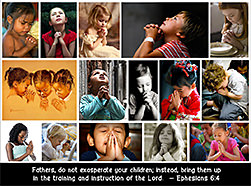
Ephesians 6:1–4 . . .
“Children: Obey and Honor Your Parents”
In our previous week’s enlightening study titled “Instructions for Christian Households — Part 1 of 2” (5:21–27), Paul challenged the Ephesians to respond to the gospel with how they live out their own life stories by describing how this is designed to work in a Christian marriage.
Jesus said that the greatest commandment is to love the Lord your God with heart, soul, mind, and strength (Matthew 22:37–38). The best place to learn this love — and the associated love for neighbor as self — is in the Christian home. This seems to be a major underlying idea behind Paul’s exhortation to children and to parents in 6:1–4 wherein we’ll learn that the primary spiritual influence in a child’s life ought to be the parent. The child, therefore, should listen to and obey the parents’ teachings.
Following his instructions for husbands and wives in Christian households, Paul directs our attention next to another of life’s great relationships: parents with children. It’s obvious that in our present world something has gone drastically wrong with this relationship. Today, juvenile delinquency and crime has skyrocketed to unimaginable and unacceptable levels.
Instruction #1 (6:1)
Perhaps the most distressing thing about juvenile crime and delinquency is the indifference or helplessness of parents. Relief from this will be felt only when we hear again the great words of Apostle Paul in this epistle, which answer all such conflict. In one sentence (5:21), he’s put his finger precisely on the solution to today’s overwhelming problems of conflict between various groups.
He applied this “need to prioritize and revere Christ” approach to various relationships. We’ve already examined the matter of husbands and wives and with it the realm of marriage conflict. Now we come to dealing with problematic relationships between parents and children. Paul aims his first directive to the children:
6 1Children, obey your parents in the Lord, for this is right (Ephesians 6:1 NIV).
In this brief set of instructions for children, Paul’s first verse offers a clearly written summary to children still living under the authority of their parents. The emphasis here is on godly obedience, which is submission grounded in a love for God.
Specifically referred to as being “right,” children are to obey their parents. That’s a non-negotiable mandate presented by God in Scripture. It shouldn’t be unusual to expect children to follow their parents’ instructions. Not only are parents responsible for bringing the child into the world, they have a much better picture of what’s best for their child. Even when these instructions are hard to understand, children will benefit by trusting and obeying their parents in the Lord. This God-honoring parent-child dynamic is designed to act as a powerful parable that highlights the relationship between God and all of his children.
The word for “Children” here simply refers to offspring — to a son or daughter with no specific age in mind. But contextually, Paul is speaking clearly of children still living in the home, under the parents’ authority. The key and “right” follow-up to the “obey your parents” directive is in the phrase “in the Lord.” With the Christian family in mind, the apostle is writing to children in the congregation upon whom he puts responsibility. Assumedly, both partners, in unison with their offspring, recognize and revere the lordship of Christ. After all, the local congregation acts as a church family consisting of God-honoring people of both sexes and all ages. Church events should be child-friendly so that children will, without difficulty, take God’s Word seriously and agree to be held accountable for what they hear.
Paul’s 6:1 command was made with the expectation that parents love and protect their children, and that children will obey their parents until they’re able to live independently.
Instruction #2 (6:2–3)
Next, Paul refers to the Torah — the first five books of the Old Testament. The commandment is originally found in Exodus 20:12, which states “Honor your father and your mother, so that you may live long in the land the Lord your God is giving you.”
2“Honor your father and mother” — which is the first commandment with a promise — 3“so that it may go well with you and that you may enjoy long life on the earth” (Ephesians 6:2–3 NIV).
This instruction, derived from the fifth of the Ten Commandments, is the first which comes with an explicit consequence: The promise is that of a blessed, long life. While this is specifically a promise to Israel, in a generic sense it’s a common-sense truth that applies to everyone. Children who grow into disrespect and disobedience towards their parents usually have a much harder life. Learning to respect legitimate authority is key to one’s personal success. Honoring parents is something God commands as well as rewards.
Clearly, the command to honor mother and father passes virtually unchanged into the new covenant relationship with Christ. It should be easier for us to see the duty that v. 1’s command gives to parents. Children must obey and honor their parents, but parents must do everything in their power to make this obedience a joy — not a burden (v. 4). This doesn’t mean that parents are to become lax disciplinarians; instead, they’re commanded to raise their children wisely so they can facilitate their children’s conscious efforts to choose what pleases Father God.
Returning to his reference of Exodus 20:12, Paul states next that honoring one’s parents included promises in two areas. First, for the Israelites, this commandment claimed that obedience would cause things to “go well” with them. This is a more general blessing rather than a specific one, suggesting that God commands and rewards those who honor their parents. Such a blessing was originally given to Israel, however, the blessing application upon those who honor their parents clearly extends to believers today (vv. 1–3).
Second, the Israelites had been promised they’d “live long in the land,” which is a particular promise made to Jews living under Mosaic law. Christians — then and today — have no “land” the way the Jews had when the Ten Commandments were written. Instead, a Christian’s obedience leads to heavenly rewards in a kingdom not of this world.
Parents shouldn’t discipline without reason but should have rules that are clear and consequences that children can reasonably foresee before they engage in disobedience. When discipline is necessary, mothers and fathers should also take the time to explain why a punishment is meted out in order that children might learn the error of their ways. This is, in fact, how the Lord disciplines us. He lays out the way we should follow, promises specific punishments for disobedience, and so forth (Deuteronomy 28; Hebrews 12:3–17).
Matthew Henry reminds every parent that “Your children are pieces of yourselves, and therefore ought to be governed with great tenderness and love. When you caution them, when you counsel them, when you reprove them, do it in such a manner as not to exasperate but endeavor to convince their judgments and work on their reason.”
Godly Discipline, Training, and Instruction (6:4)
Interestingly, after Paul wrote three verses dedicated to how children should obey both parents, his fourth verse was directed specifically to fathers. The family’s father, as the head of the household, has the ultimate responsibility to choose how to raise his children. In practice, this instruction is meant for the father and mother, and would have been understood that way by Paul’s readers.
4Fathers, do not exasperate your children; instead, bring them up in the training and instruction of the Lord (Ephesians 6:4 NIV).
Paul seems to direct what he’s saying here primarily to fathers. And if this were the case, that would be fine, because, as we learned back in chapter 5, fathers are supposed to be the head of the household. But the Greek word used here can also refer to both parents. So although our translations often say “fathers,” these instructions are for both mothers and fathers.
To “exasperate” = infuriate, madden, provoke to wrath. Christian parents should never do this. Paul speaks against this harsh kind of parenting since it gives an unnecessary justification to a child’s natural rebellion. Not exasperating our children also means that we don’t become Pharisees who lay burdens on our sons and daughters they cannot carry (Matthew 23:1–4). This entails avoiding legalism at all costs: Nothing will provoke a child to rebel more quickly than a legalistic spirit. It also means not sheltering children from the world entirely, lest they be unprepared to face it when the time comes.
“At the same time, Paul’s instructions here point out that parents have a responsibility to encourage obedience in their children, rather than frustrate them. Fathers are reminded in v. 4 that they need to raise their children with “training and instruction,” but should be careful not to frustrate them by being petty or unfair.”[1]
Christian fathers are exhorted not to provoke their children to anger or resentment. Positively, they are to nurture their children by promoting the child’s growth and development; to “nurture” means to cultivate life to maturity. By way of illustration, one nurtures a little seedling into a mature, fruit-producing plant. So the task for the Christian father is to cultivate his children’s development, especially their spiritual development for Christ.
Closing Considerations
Obeying one’s parents is a direct command from God. “Children, obey your parents in the Lord, for this is right” (v. 1). The word obey in this verse is linked to the idea of honoring them in the next verses: “‘Honor your father and mother’ — which is the first command with a promise — ‘so that it may go well with you and that you may enjoy long life on earth.’” Honor has more to do with one’s attitude of respect toward one’s parents, while obedience is to be done with an attitude of honor toward them. Grudging obedience doesn’t conform to the command. Children must be filled with the Spirit to appropriately obey and honor their parents.
It may be challenging for children to learn to honor and obey their parents — it’s harder for some than others! But there’s a very good reason for this command. Proverbs teaches that those who listen to their parents gain wisdom: “A wise son heeds his father’s instruction, but a mocker does not respond to rebukes” (Proverbs 13:1). God’s design is for children to learn to honor and obey their parents as they grow up so they can live wisely. As they learn respect in a Spirit-filled home, they’ll respect others appropriately when they leave the home.
As children have a responsibility to obey their parents, parents have a responsibility to instruct their children in the ways of God (v. 4). But even if one’s parents aren’t following the command directed toward them, children in the home are still commanded to obey and respect their parents. Our ultimate responsibility is to love and obey God, above all else. He’s commanded children growing up to obey their parents.
Dr. Charles Stanley’s Daily Devotion — Ephesians 6:1–4
Here’s how to become a successful father. No human father is perfect. But with guidances from Scriptures, the Spirit, and godly mentors, a man can become a successful dad by intentionally leading his children in these areas…
Spirituality Help your children to trust in Jesus Christ as early as possible, and they’ll grow with the understanding that He is to be at the center of everything that they do.
Morality In homes where honesty, purity, and loyalty are lived out, boys and girls learn to value integrity and listen to their conscience. This will also help them develop a habit of seeking the Holy Spirit’s direction.
Relationships Teaching about love, respect, and mutual encouragement is good preparation for friendships and marriage.
Vocation Model cooperation and the way to work “heartedly, as to the Lord” (Colossians 3:23 NKJV), and your children will form a healthy work ethic.
Finances Teach the right way to handle money: to earn honestly, give generously, save intelligently, and enjoy heartedly.
Authority Unless children learn to function properly under authority (of parents, school, church, and government), rebelliousness can easily arise. Our sons and daughters sometimes see a disconnect between our conduct and words. Setting a good example is essential.
The way to build guiding principles into a child’s life is by precept (teaching) and practice (modeling). Dads, if you plant these healthy concepts in your children’s hearts, what a joy it will be to see them equipped and motivated to fulfill God’s purpose for their life.
Apostle Paul’s Personality and Passion on His Missionary Journey in Ephesus
† Watch this video highlighting Paul in Ephesus — created by Our Daily Bread Ministries.
Intro Video: “Ephesians”
† Here’s a superb run-through video of this epistle, created by BibleProject.
- Q. 1 What’s the first and foremost reason why children are to obey their parents?
- Q. 2 What’s the difference between obeying one’s parents and honoring them?



